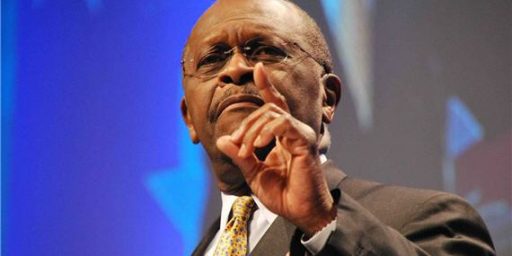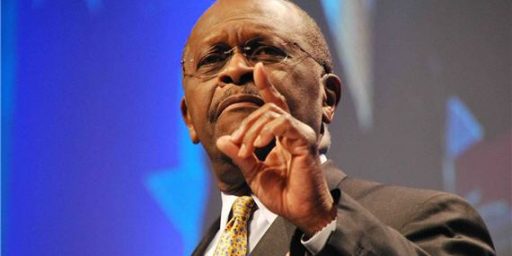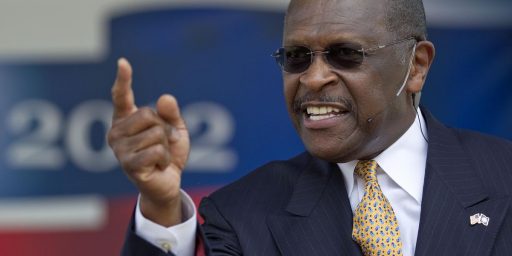The Truth About All Those Plans From Presidential Candidates
For the most part, all those plans the candidates release are barely worth the paper they're written on.
In a comment to Steven Taylor’s post on Saturday about the institutional barriers to Herman Cain’s 9-9-9 plan, Chris Lawrence makes this point:
[R]ealistically we live in a world where the media demands these plans at a level of detail that no president can deliver on, and pundits (like us) immediately jump on minor details of a plan that, in all likelihood, bears little resemblance to what will end up being put before Congress in the end, rather than treating them as initial negotiating positions, which is essentially what they really are.
This is a point that I think nearly everyone who talks about the “plans” that Presidential candidates put forward forgets, including myself. It is almost never the case that any of the specific plans that a Presidential candidate puts forward during the course of a campaign ends up getting implemented in a form resembling that plan if the candidate wins. The one notable exception that comes to mind is the Economic Recovery Act of 1981, which included tax cuts that had long been part of Ronald Reagan’s 1980 campaign and which had been based on ideas that Congressman Jack Kemp and Senator William Roth had been talking about for several years previous. Even in that case, though, the tax cuts that ended up being implemented were lower than what Kemp and Roth originally proposed, because what could pass is the best that could get through a Democratic controlled House.
More often than not, these plans that candidates proposed are really just campaign props or, at best, initial negotiating positions as Chris put it. For example, during the Presidential campaign in 2008, Barack Obama opposed the health care reform plan proposed by Hillary Clinton principally because he opposed health insurance mandates. Two years later, he signed into law a health care plan that includes an individual mandate, because that’s what they were able to get through Congress. That’s how Washington works.
Today at the National Press Club, Herman Cain was asked how he’d be able to get the 9-9-9 plan through Congress in the light of how difficult it was to even get the debt ceiling increase through Congress this summer. It’s a logical question, of course. What Cain is proposing is perhaps the most radical overhaul of the nation’s tax code in decades, and our recent experiences make it pretty clear how hard it is to get anything through Congress. The Democratic opposition to such a plan is easy to anticipate, and would be a factor even if the GOP manages to gain control of the Senate. However, even Republicans aren’t completely sold on the 9-9-9 plan, or Rick Perry’s plan, or Mitt Romney’s. The idea that they’re just going to roll over and do whatever Cain wants because he’s the President reveals a rather naive view of how Washington works. Ronald Reagan appealed to the American people in 1981 to get his tax cut plan through Congress, but he also worked with Congress to make sure that the bill that was presented was one that actually had a chance of passing. We don’t live in a dictatorship, and the President isn’t going to be able to get away with telling Congress what to do, at least not when it comes to something as important as tax policy.
As Chris notes, the pundits are somewhat at fault here for demanding a level of specificity from candidates for President that is sometimes just a little absurd. The President has an entire bureaucracy and a team of political aides that help him put together the budget plan that gets sent to Congress every year. Even the most well-funded Presidential candidate has, at most, a team of economic advisers who have to rely on the economic statistics made available to them, and everyone else, by the very President their running against. The idea that they need to come up with a detailed plan that will probably never be implemented seems some what silly. Of course, it’s not all the pundits fault. You don’t hear Herman Cain saying “This is my initial negotiating position.” He says “This is my plan,” as does every other candidate and accompanying each such statement is the unstated implication that they will get it passed into law. Perhaps if we all viewed these things more realistically, we wouldn’t have to waste so much time on the details of a plan unlikely to see the floor of the House of Representatives.







This is all exactly right. Then again, we have to judge potential presidents on something and I’m not sure that their preferred public policies–notwithstanding the feasibility of enacting them–is a particularly bad starting point. Presumably, it gives some indication as to which direction they would strive to lead us.
What they do signal, by their common charachteristics, is a broad-based intent by Republicans to slash taxes on the wealthy, raise taxes on the middle class, explode the deficit, and shift the costs to the sick, the poor, and the elderly.
If that is the sort of thing you believe will make this a better country, I urge you to vote Republican.
Saying “this is my plan” for something that doesn’t pass the drop test ….
That’s a worse sort of fail.
What Norm said. Doug, you’re not wrong, but I find it far more galling that the press & pundits tend to focus on asking those pointless detail questions, while avoiding the elephant in the room – that if Cain’s plan (or Perry’s, or Ryan’s, or literally _anything_ the GOP has proposed in the last decade) were actually successfully passed as specified, it would cause absolute economic devastation for at least 2/3 of all Americans, and destroy our ability to produce & compete in the global marketplace for generations to come.
@legion:
I’ve written several pieces about the 9-9-9 plan that raise just those points.
As you and Steven point out, domestic policies are mainly controlled by Congress, not the WH.
In an ideal punditry world :o), said pundits should focus on the candidates’ foreign policy views (domain where the WH has the upper hand), and somehow test their ability and willingness to deal with the legislative branch for domestic issues.
Don’t tell me I am dreaming, I already know that. Worse, I don’t even know how on earth the media could vet candidates according to my wishes.
P.S: As an example of my thinking I will just mention that I voted for Obama in 2008 because he seemed more reasonable that his opponent, not because I thought he was the second coming of Christ. (And I would have voted for Hilary had she been the nominee for the same reason.)
@Doug Mataconis: I know, and I appreciate them. I’m speaking more in general terms – I’ve seen lots of articles poking holes in all of the above-mentioned proposals, but none of them ever seem to get discussed anywhere except “wonk-land”…
Herman Cain is not the only one adamantly pushing a plan to become law. Obama has recently issued the same call for his American Job’s Act, employing an across country sales job on his job’s plan. Did it pass? Nope. It’s being taken apart and negotiated as we speak.
The drift of all of these plans, IMO, would not necessarily cause economic devastation either, as Legion predicts. The republican plans all feature fiscal reconfiguration which would be more business friendly. They’re based upon a completely different ideological paradigm. The current one, these past few years, has mainly been Keynesian driven, an economic model appealing to social progressives. If one of the republicans secures the WH, their objectives will be planted in soils favoring more free market approaches. How these philosophies will materialize, in actual real-time bills, though, remains to be seen. If elected, Cain’s 9-9-9, for instance, will be transformed into something other than 9-9-9 at the end of the day.
I believe what voters should be focusing on more than the details of these plans, should be their outlines, where they are trending, and the political/philosophical vehicles they seem to be using to get from here to there.
@jan:
This is more accurate.
It is pretty telling that there isn’t really any chatter or boasting in conservative circles about restoring the middle class, or creating a society in which the working people have more economic power, or in which the level of poverty is reduced.
Instead its almost entirely “if you are poor, its your own fault.”
IGMFU.
The more sly pundits attempt a variation of “rising tide lifts all boats” nonsense, but they shut up or attempt a diversion when its pointed out that for the past 30 years the tide has lifted only yachts and nothing else.
When Republican audiences roar approval at letting sick people die for lack of care, I think its pretty clear that any principled, Burkean conservatives have long since fled the room.
You can tell by Jans nonsense that what the candidates say about their plans makes no difference to the base. They believe what they want to believe.
@Liberty60:
Liberty60, while some people here punt their remarks with lots of sarcasm, you appear to genuinely espouse comments from a belief system whereby R’s are seen as morally lacking.
I disagree.
Your reference to “a rising tide lifts all boats,’ is one originally attributed to JFK during a speech given in 1963. Such a saying was also a favorite of Robert Rubin, former democratic Secretary of Treasury. And, currently such an axiom has now been retooled by Gene Sperling, counselor to Tim Geithner, as (paraphrasing) “a rising tide will lift some boats while grounding others.” So, what you believe to be the creation of ‘sly pundits,’ is actually phrasing coined by a democrat, and carried forth into recent history as a fiscally credible, and at least a semi- viable way of rectifying a weak economy.
I also personally don’t view the R’s philosophy as being morally insufficient, depraved or callus as those on the left do. R’s tend to look at people equally, as to their ability to rise or sink, based on an individual’s own motivation, work ethic and set of values. After all, this country has always been viewed as a melting pot of cultures, more amenable to diversity than most any other country in the world. Consequently, for the most part, there has been a moving escalator in place in which any person could start at the bottom and work their way to the top, no matter their given race, color, creed, or heritage. This is what hope and dreams often rely on, this very concept of being able to get somewhere from nothing.
However, circumstances now are different, and such an escalator is considered “broken.” IMO,What has changed, though, in the last 30-40 years has less to do with a rising tide failing to lift all boats than with a rising expectation by more and more people that everyone should be taken care of no matter the reasons behind their problems. This is enabling people, pure and simple, and can be just as harmful as refusing to help them at all. It all goes back to a balance of encouraging and supporting people’s motivation, pride and confidence in themselves, rather than (with all good intentions) holding pity parties, handing out goodies or fulfilling requests of people in need (such as students wanting their loans forgiven).
Basically, self reliance is the paradigm in which republicans work off of, while government subsidies, creating dependencies on a centralized power is where leftist democrats see the state as being omnipotent and all serving to the people. So, as I see it, it’s a difference of philosophies presenting themselves in political parties, rather than just rendering a blanket judgment of one party being more cruel than another.
As for that example of a ‘roaring audience’ approving of letting a sick person die — that was so misinterpreted by the press and others. The religious fractions of the republican party have long been involved in working with the poor, troubled, sick and less fortunate all over the world. Between secular and religious outreach, the latter is second to none in doing voluntary service to humanity, giving charitable donations to places/people in need, working in ravaged areas like Africa, Haiti, etc. This is just one of those absurd misnomers that gets passed around and becomes a disparaging ‘fact,’ especially in the circles of the political elite.
@jan: “IMO,What has changed, though, in the last 30-40 years has less to do with a rising tide failing to lift all boats than with a rising expectation by more and more people that everyone should be taken care of no matter the reasons behind their problems.”
This is factually untrue.
For the past 3 decades, wealth and income of the middle class has stagnated or declined.
No, it is not IMO, it is a provable fact.
It is also a provable fact that the wealth and incomes of the 1% have soared.
There is no rising tide, and there is no argument to the contrary.
Doug:
I think the fact that there are so few comments on this thread indicates that nearly everyone agrees that tax plans from presidential candidates are meaningless.
What pure unmitigated crap.
If you really believe that you need psychiatric help. (probably more than you are already receiving)
Explain to me how billions in oil subsidies, which so-called republicans refuse to reduce in any way, fits into this world view? Short answer…It doesn’t. And it points up the total fallacy of your unicorn fantasies. Jesus-god you are full of shit.
@jan:
The really important difference is that Obama’s plan is functional out of the gate. Oh, you may not like its philosophy, but you have to attack it on that level. You can’t say it destroys US solvency, immediately, as 9-9-9 would do.
The “bargaining chip” BS on 9-9-9 ignores that 9-9-9 doesn’t need tweaks – nothing close would even work, would even pass the bounce-test.
So really there are two truths here:
– Presidents cannot pass their plans unilaterally
– Voters can nonetheless judge candidates by the reasonableness of their plans
A stupid proposal isn’t going to fly through congress, or so we should hope, or so we should vote.
Doug good post, however a good initial negotiating position is important.
Also just because a plan usually falls apart or doesn’t go as planned doesn’t mean it shouldn’t be done and done in detail.
In the military we use to do some very detail planning. The plans seldom ever stay intact even before first contact. However those who did the detail planning usually were much more successful than those that slap some generalities together. I have seen similar results in the civilian and sporting world. I solid plan with some details that doesn’t work out almost always beat the “well I just want to win” or “we just have to want it more than the other team” plan.
Yes there are unique obstacles in the political world as in any particular world. However having a plan with details is still wise especially for a President. Otherwise you will get a President that says “congress just needs to pass something anything and I will sign it”.
@JP
Are Presidents suppose to be leaders or not? Just because they are not dictators don’t mean they can’t lead and have influence on the outcome.